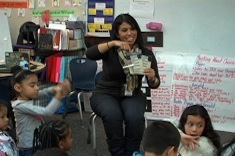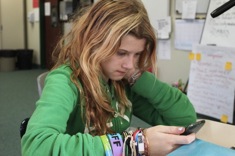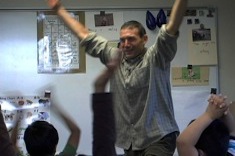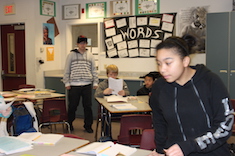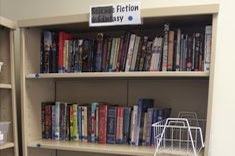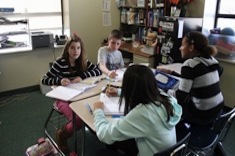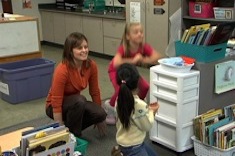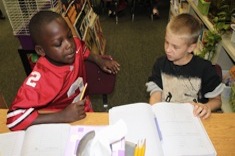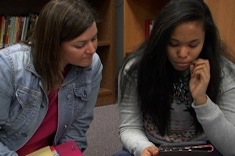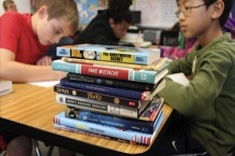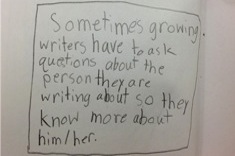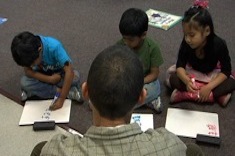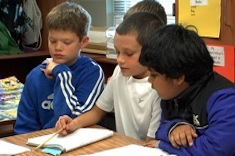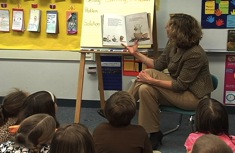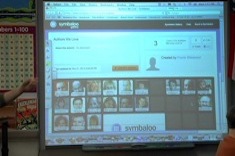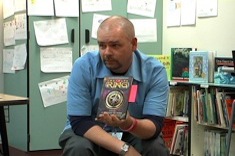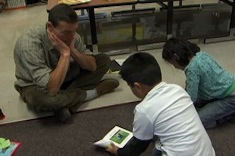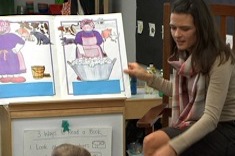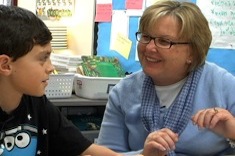Teaching Reading
Our contributors lead reading workshops in classrooms with creative flair. Over the past 12 years, we've filled our site with loads of suggestions, tools, and tips for using engaging books throughout the curriculum to hook kids on reading. Here is where you will find many stories of successful and not-so-successful workshop days, and what we learned from them. We bring these stories to life through hundreds of video examples.
Latest Content
Integrating Vocabulary and Retelling Strategies into Read-Aloud
Stella Villalba scaffolds the language development of her first- and second-grade English language learners during read-aloud by highlighting vocabulary and providing a tool to assist with a partner retelling activity.
Vocabulary and iPhones: A Four-Step Process for Independent Student Word Learning
Bryce Bennett develops a four-step process to help high school students use their smartphones to master difficult vocabulary while reading.
Linking Movement, Minds, and Literacy in Kindergarten
Max Brand explains how movement activities in classrooms with young learners can be so much more than a brain break or “getting the wiggles out”: movement can forge potent connections between mind, body, and story. The essay includes two video examples.
Student-Selected Vocabulary in Middle School
Katie Doherty shares many ways to make vocabulary learning fun in middle school, beginning with students working together to select words to study each week.
Curating the Classroom and School Library
As classroom budgets get tighter, teachers rely more and more on school libraries for books. Erin Ocon describes how she has changed the way she matches books and readers in her middle school classroom, depending more on school library resources and helping her middle school students navigate them.
Conferring to Build Stamina in First Grade
Katie DiCesare works with first grader JJ to help him meld decoding and comprehension skills.
The Power of Read-Aloud Notebooks
Karen Terlecky shares the process of launching and sustaining read-aloud notebooks with fifth graders.
Backing Up and the Bossy E
In this conference with second grader TJ from Sean Moore’s classroom, the strategies of backing up and rereading as well as attending to the “bossy e” are discussed.
From “Show Me the Lessons” to Sustainable Planning (Part 4 of the Opinion/Argument Writing Series)
This is the final installment in Heather Rader's series on argument and opinion writing in the intermediate grades.
Movement with First Graders
Katie DiCesare leads her first-grade students through movements and a song, and explains in the debrief why movement activities are valuable for young learners.
Peer Conferring: The Release Phase
Amanda Adrian concludes her series on peer conferring, analyzing the value of students working on their own after instruction and practice.
Fantasy Reading in Eighth Grade
Katie Baydo-Reed confers with an eighth-grade student who is reading The Hobbit.
Lists, Facts, and Reports: Conferring with Anna
Franki Sibberson confers with fourth grader Anna to help her connect report writing with her love of animal lists.
A Graphic Novels Unit in 5th Grade
Katherine Sokolowski designs a graphic novels unit for her fifth graders, and is surprised by how much the genre delights them.
Understanding Adolescent Readers: A Podcast with Penny Kittle
In this podcast, Penny Kittle chats with Franki Sibberson about how to inspire a passion for reading in adolescents. A full transcript is available below the player.
Building Peer Conferring Skills in the Primary Grades
Ann Marie Corgill questions whether her second graders are ready for peer response. She finds that with some guidance and construction of anchor charts together, the answer is a resounding yes.
Using Wipe-Off Boards with Young English Language Learners
Max Brand describes why wipe-off boards are such a valuable tool for work with young English language learners in small groups. The article includes a video demonstration.
Brainstorming Student Blogs
Franki Sibberson works with a group of students who want to create a collaborative blog of interviews. The discussion reveals some of the challenges of blog writing, including consistent posting and developing topics that might endure over time.
Previewing and Picture Walks with Fiction Texts
Clare Landrigan and Tammy Mulligan provide previewing how-to advice for grades K-2 teachers.
Eyes on the Fries: Just-Right Books and Reading Peer Pressure in Middle School
Gretchen Taylor addresses the issue of "peer-pressured reading" in middle school reading workshops, with a practical example of how she helped her students move beyond the fad book of the moment to more thoughtful previewing and independent reading choices.
Helping Students Develop Independent Previewing Skills
Franki Sibberson's goal is to provide her students with more tools for previewing books independently and making wise selections. In this lesson, she makes full use of technology to set up sites and resources for students to browse at school or home.
Book Talks in 4th Grade
Tony Keefer previews Infinity Ring with his fourth graders, and talks about the value of book talks for building a reading community.
Bully Literacy
Heather Rader shares texts for building understanding about bullies.
Book Matchmaker: Nonfiction to Read Cover to Cover
With the Common Core emphasis on nonfiction, teachers are striving to integrate more nonfiction texts throughout their literacy workshops. Franki Sibberson shares her favorite nonfiction texts that can be read cover to cover.
Two Teachers and One Kindergartner
Principal Jennifer Schwanke looks at the challenging issue of retention and the power of teamwork.
Fun in January: A Mock Caldecott Unit
Katherine Sokolowski discovers a seven-day Mock Caldecott unit is a fun way to build a reading community by predicting the winners, and Skyping with another class to share results.
Guided Reading with Kindergarten English Language Learners
Max Brand takes two kindergarten English language learners from reading a familiar book to exploring a new text, and explains in the debrief how he targets specific reading skills.
A Picture Walk in Kindergarten
Mandy Robek takes her kindergartners through a picture walk using Mrs. Wishy Washy as the text.
I Love a Good Argument
As Heather Rader works with teachers and teams on opinion/argumentative writing, she’s considering the anatomy of an argument and engaging ways to teach it.
Catching Up with Tommy
Karen Terlecky meets with Tommy, a boy who has flown under the radar for a few weeks in her fifth-grade reading workshop.
Browse Content By
Type
Category
- Assessment Tools
- Big Fresh Archives
- Booklists
- Choice Numeracy
- Classroom Design
- Common Core
- Community Building
- Conferring
- Content Literacy
- Digital Literacy
- English Language Learners
- Equity
- Family Relations
- Free Samples
- Guiding Groups
- Leadership
- Literacy Coaches
- Mentor Texts
- Minilessons
- New Teacher Mentors
- Podcasts
- Poetry
- Quote Collections
- Reading Strategies
- Self Care
- Struggling and Striving Learners
- Talking and Listening
- Teacher Study Groups
- Teaching Reading
- Teaching Writing
- Word Study and Vocabulary
Author
- Melissa Quimby
- Nawal Qarooni
- Gwen Blumberg
- Julie Cox
- The Lead Learners
- Hannah Tills
- Josie Stewart
- Ruth Metcalfe
- Mallory Messenger
- Becca Burk
- Jodie Bailey
- Vivian Chen
- Mary Brower
- Tiffany Abbott Fuller
- Stephanie Affinito
- Ruth Ayres
- Leigh Anne Eck
- Heather Fisher
- Shari Frost
- Julie Johnson
- Suzy Kaback
- Gigi McAllister
- Shirl McPhillips
- Melanie Meehan
- Cathy Mere
- Debbie Miller
- Tara Barnett and Kate Mills
- Tammy Mulligan
- Dana Murphy
- Bitsy Parks
- David Pittman
- Brenda Power
- Heather Rader
- Matt Renwick
- Mandy Robek
- Christy Rush-Levine
- Gretchen Schroeder
- Jen Schwanke
- Brian Sepe
- Katherine Sokolowski
- Stella Villalba
- Jennifer Vincent
Grade Level
Choice Literacy Membership
Articles
Get full access to all Choice Literacy article content
Videos
Get full access to all Choice Literacy video content
Courses
Access Choice Literacy course curriculum and training

